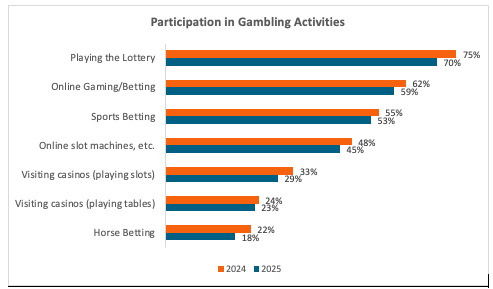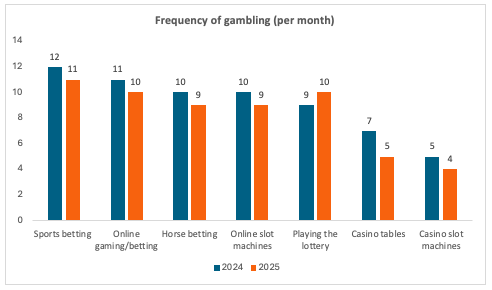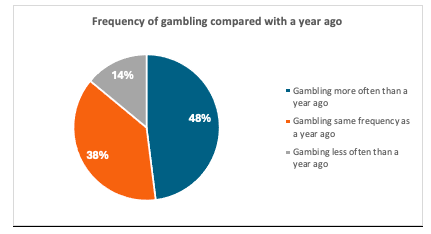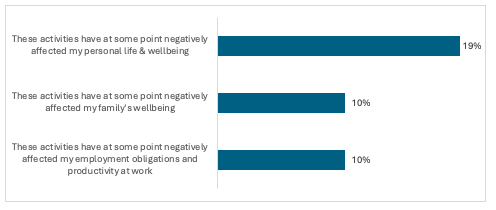Gambling has long been a part of South Africa’s social and economic landscape, evolving from informal betting practices to a highly regulated industry.
Today, the sector includes everything from casinos and sports betting, to the rapidly expanding online gambling market. While it generates significant revenue and employment opportunities, it also raises concerns around addiction, illegal operations, and regulatory challenges.
In March 2024, infoQuest – one of South Africa’s leading online research companies – conducted a survey into the habits and attitudes of local gamblers.
A follow-up in April 2025 tracked key shifts over time, while also uncovering fresh insights into the evolving gambling landscape.
Approximately 300 gamblers were interviewed in each wave of the study.
“Financial strain is evident, with a significant number of individuals using essential or borrowed funds to support their gambling habits, and many incorporating gambling expenses into their monthly budgets. The tendency to chase winnings, alongside reported feelings of loss of control, especially among younger gamblers, highlights the psychological grip gambling can have.,” says Claire Heckrath, MD of infoQuest.
“Yet, despite these warning signs, a large majority have not sought help, and those who have mostly turned to informal support networks, which may lack the expertise needed for effective intervention.”
Participation in types of gambling activities
Overall, gambling participation has seen a slight year-on-year dip – but the digital tables are turning. The National Lottery remains South Africa’s most popular gambling activity, but online gaming/betting and sports betting are rapidly gaining traction, particularly among younger gamblers aged 18–34.
In contrast older gamblers still gravitate towards traditional lottery play.

Frequency of gambling
Sports betting remains the most frequent type of betting with an average incidence of 11 times per month. Frequency of engaging in different types of betting has remained consistent year-on-year, although gambling at casino tables has declined from 7 to 5 times per month.

Frequency of gambling compared with a year ago
Nearly half of South African gamblers (48%) say they’re gambling more often than they were a year ago – a trend that’s ringing alarm bells.
This surge in frequency points to growing engagement, possibly fuelled by the rise of easily accessible online platforms, aggressive marketing, and shifting social norms.
The findings raise serious concerns about the potential for increased gambling addiction and underscore the need for closer monitoring of gambling behaviour and its broader societal impacts.

Using surplus funds or needed funds for gambling?
Only 37% of gamblers claim they use surplus funds – money that they don’t need for anything else – to gamble. This means that a concerning 63% are likely using money meant for essentials, savings, or other financial commitments.
The data suggests that the majority of gamblers may be putting their financial stability at risk in order to fund their gambling habits.
Continued gambling vs cashing out
One in three gamblers use their winnings to play again, suggesting a tendency toward chasing further gains, which could heighten the risk of financial loss.
Gambling funds are a ‘budget expense’
Around 50% of gamblers report incorporating gambling in their monthly budgets – right alongside essentials like rent, groceries and utilities. This suggests that for many, gambling has shifted from an occasional pastime, to a regular financial commitment.
By planning for gambling expenses the same way they would for everyday necessities, a significant portion of gamblers may be normalising the habit as part of their routine financial life – a shift that raises questions about long-term financial well-being.
Gambling on borrowed funds
About 16% of gamblers claim to have borrowed money at some point to fund their gambling. However, this figure is likely understated, as borrowing for gambling can carry significant stigma and shame, leading some individuals to under-report this behaviour.
The true extent of borrowing may be higher, indicating a deeper financial risk among those who gamble.
Negative effects
15% of the respondents say that at some time they have been unable to control their desire to engage in these activities, even though they didn’t have the money, but once again this may be understated due to the sensitivity around this issue.
Of concern is that gamblers in the younger age category (18–34 years) are more likely to feel that they are unable to control their gambling desire.
Other negative effects are reported:

How many gamblers are seeking help – or thinking about it?
About 1 in 5 gamblers have sought help or are currently seeking help for their gambling ‘addiction’.
‘I have sought help in the past. – 12%
‘I am currently seeking help.’ – 7%
The 12% who have sought help in the past are still gambling, perhaps less frequently, but they are still participating in the activity. What does this mean for the effectiveness of help provided? When asked who they sought help from, it was mainly family members or friends, who may not be qualified to give professional assistance in this particular field.
Another 10% state that they have thought about seeking help, but haven’t done so yet, while 67% have never sought nor considered seeking help.
The survey reveals a complex and evolving picture of gambling behaviour in South Africa. While participation in gambling activities has seen a slight year-on-year decline, the frequency and intensity of engagement – particularly among younger adults – remains high, with sports betting and online platforms leading the way.
Alarmingly, nearly half of gamblers report increased gambling frequency over the past year, raising concerns about the rise in problem gambling and the influence of digital accessibility.
These trends underscore the urgent need for a multi-faceted response – combining stronger regulatory oversight, greater access to professional support services, and targeted public education.
Without meaningful action, gambling may increasingly shift from a recreational activity to a serious social and economic concern for many South Africans.














